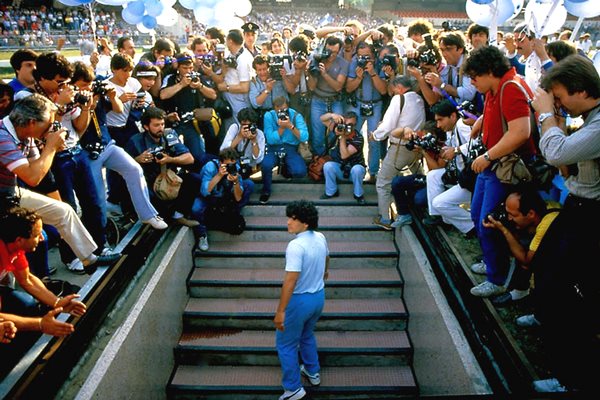There are martyrs and there are gods. Portraying both in one personality is the challenge that filmmaker Asif Kapadia faces for his first feature documentary after his previous acclaimed effort, Amy, about the singer Amy Winehouse.
Controversial Argentinian soccer star Diego Maradona once inspired a massive cult due to his undeniable talent in the playing field. Even today, the worship persists, depending on who you ask. Like Winehouse, he has also lived a life damaged by drug addiction. However, the viewers’ perception of both celebrities is entirely different: it’s easy to feel empathy for the late singer as a martyr of fame, while in the best scenario you may hardly empathize with a fallen god like Maradona. With uneven results, Kapadia thinks otherwise in his attempt to humanize the world champion player.
Despite what you think about Maradona, one of the virtues of the film lies in the dynamic and simultaneous use of stock footage and testimonials. We never see talking heads in front of the camera giving insights about the sports star. Instead, we hear historians, journalists, family members, and Maradona himself, alongside TV reports, newspaper headlines, home videos, and the emblematic football matches. The assemblage works as a stream of consciousness of voices from past and present combined in a vibrant collage.
We meet Maradona first during his failed period in the Futbol Club Barcelona, then his slow-burn success in Naples, where he was transferred, and, of course, his legendary performance in Mexico, 1986, leading the Argentinean team to World Cup victory. It’s a classic story of a poor boy from the slums destined to greatness. “In the field, all the problems go away,” reflects Maradona, and over the course of his best years when he was playing soccer, the entire world held its breath witnessing pure magic. Only after the game, the problems returned: an unacknowledged son providing juicy tabloid stories, his increasing drug dependency, and the hyperbolic hate from tabloids.
Kapadia’s ability as a storyteller is demonstrated in the connections he makes between an exciting life populated by World Cup competitions, regional matches, and the high life. These links provide the best moments. In that regard, the match between Argentina and England (in Mexico, 1986) was not only about the infamous “hand of God” (a goal scored by Maradona using his hand), it was a crucial moment in Argentina’s history after being humiliatingly defeated in the Falklands War by the same opponent. Maradona’s win there and the World Cup victory in the Argentina vs. Germany game was a form of national revenge. You can understand why he inspired such huge idolatry.
In turn, his subsequent victories in Naples vindicated a team constantly mocked and despised by the rest of the country. At a later stage, fans’ loyalties in Naples turned against him when Argentina defeated Italy in the World Cup in 1990, played on Neapolitan soil. The soccer player, playing for his home country’s team, declared that Naples should support Argentina over Italy.
Maradona’s drug addiction is observed by Kapadia with a sympathetic look, with no judgment. Nevertheless, the film insists in understanding the athlete as two different halves: Diego and Maradona, highlighting the former’s more human side as a plea for a new reconsideration of the media’s perception of Maradona. (His political allegiances with communist dictators and problematic Latin American leaders are noticeably omitted.)
Despite his best efforts, Kapadia never reveals the real heart of Maradona as he did in Amy. (Is there one anyway?, someone may ask, given his reputation as a bully. He shot at journalists outside his home, among other violent incidents). The material and the portrayed figure here lack the same punch to make viewers feel touched and sympathetic. Diego’s worshipers will not find anything new here, and Maradona’s haters will remain unbending.







Leave A Comment